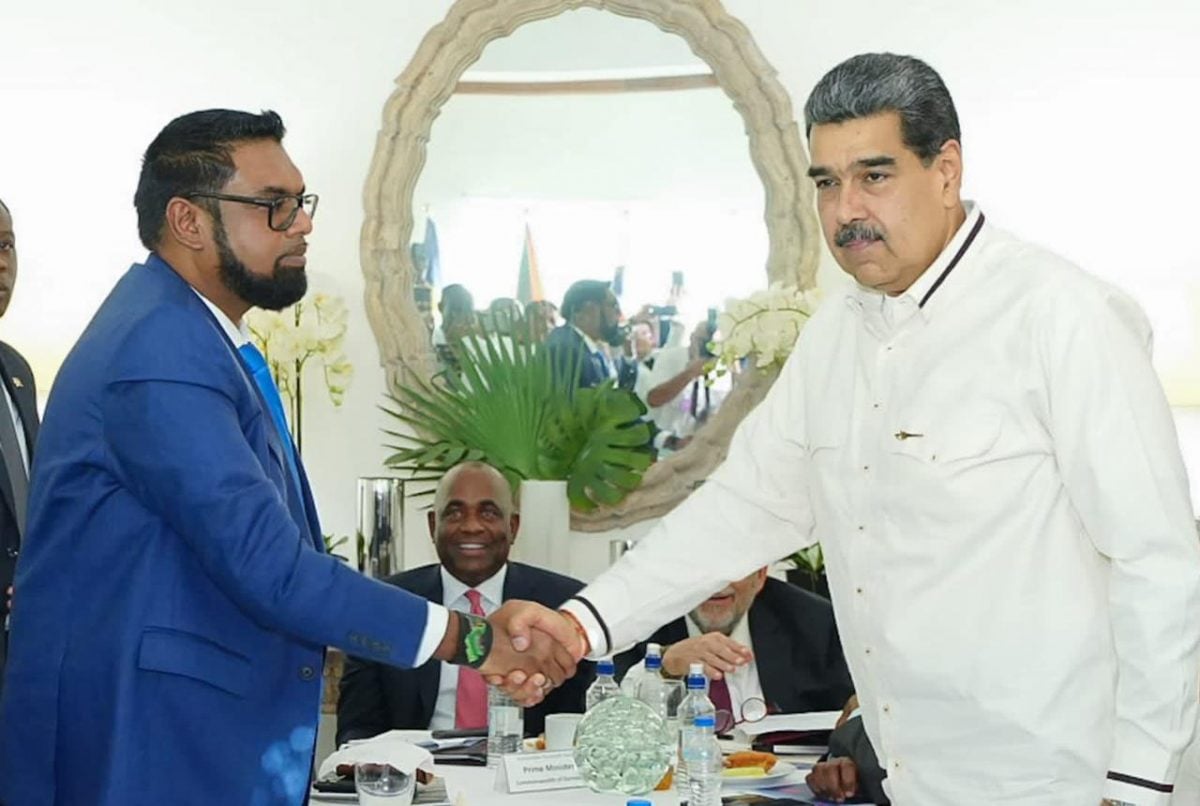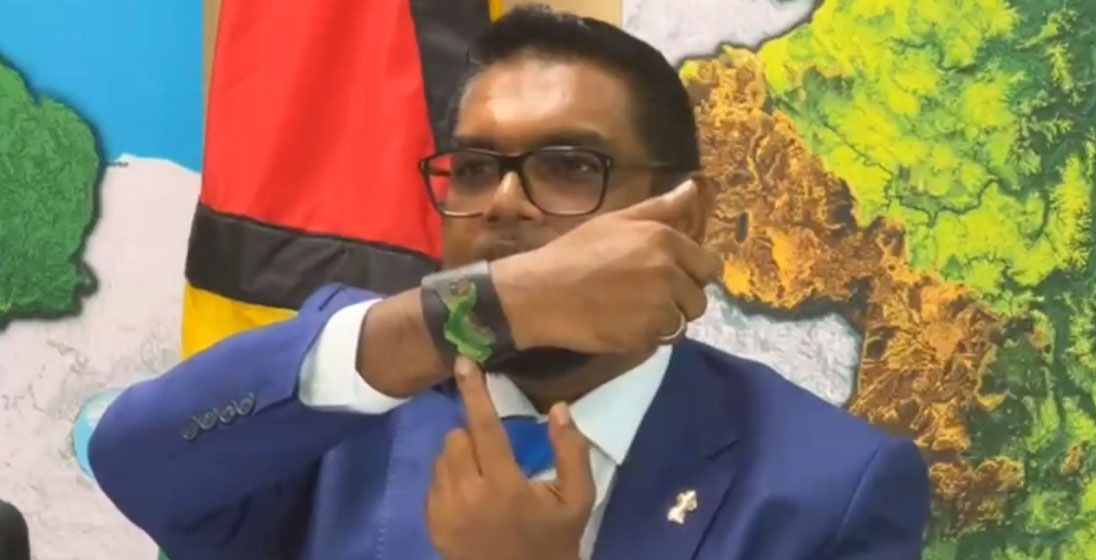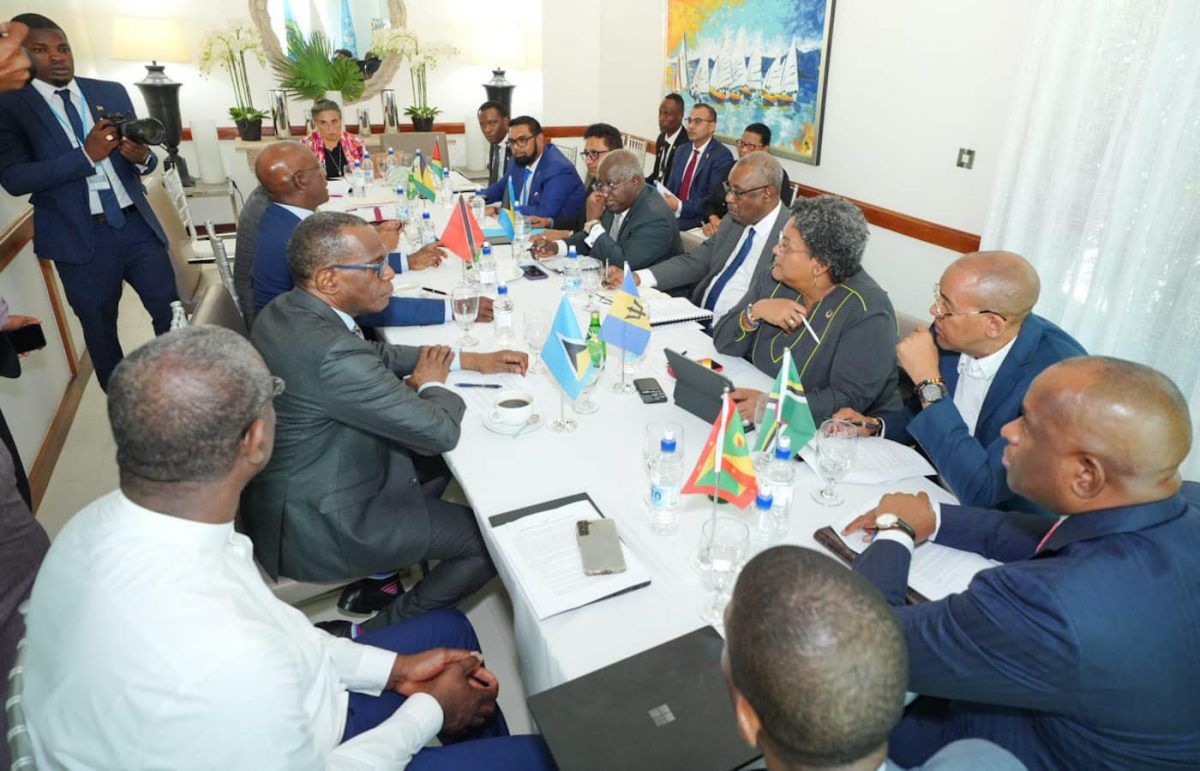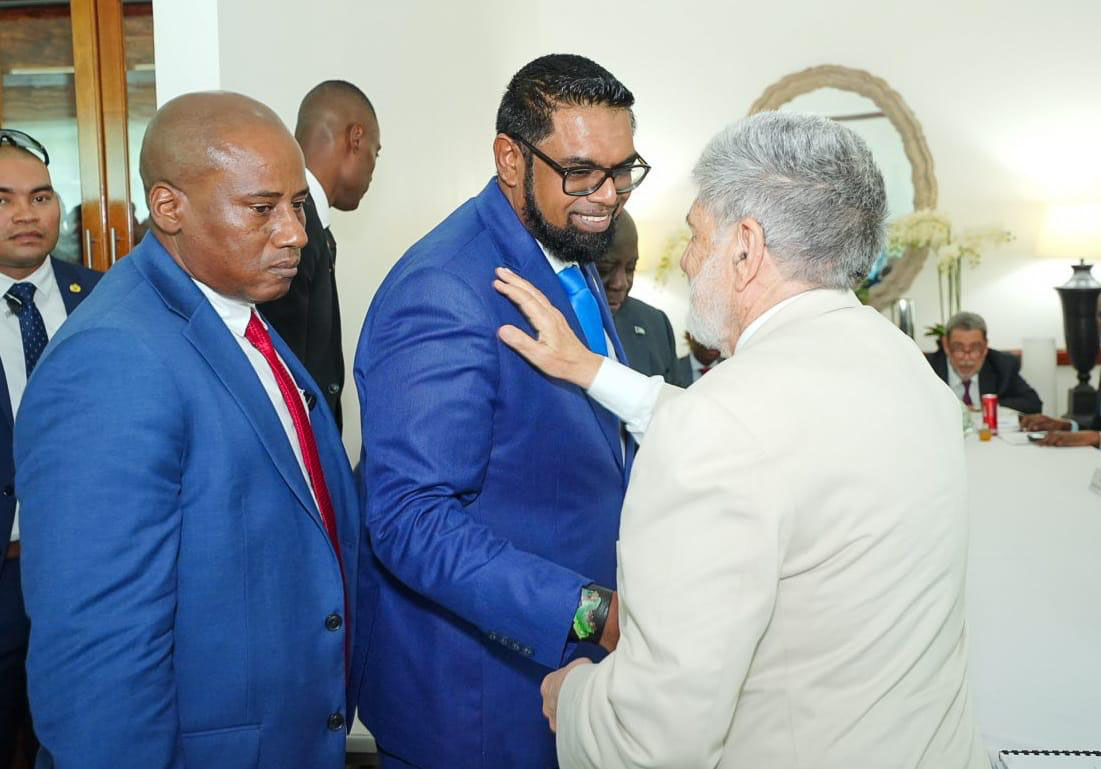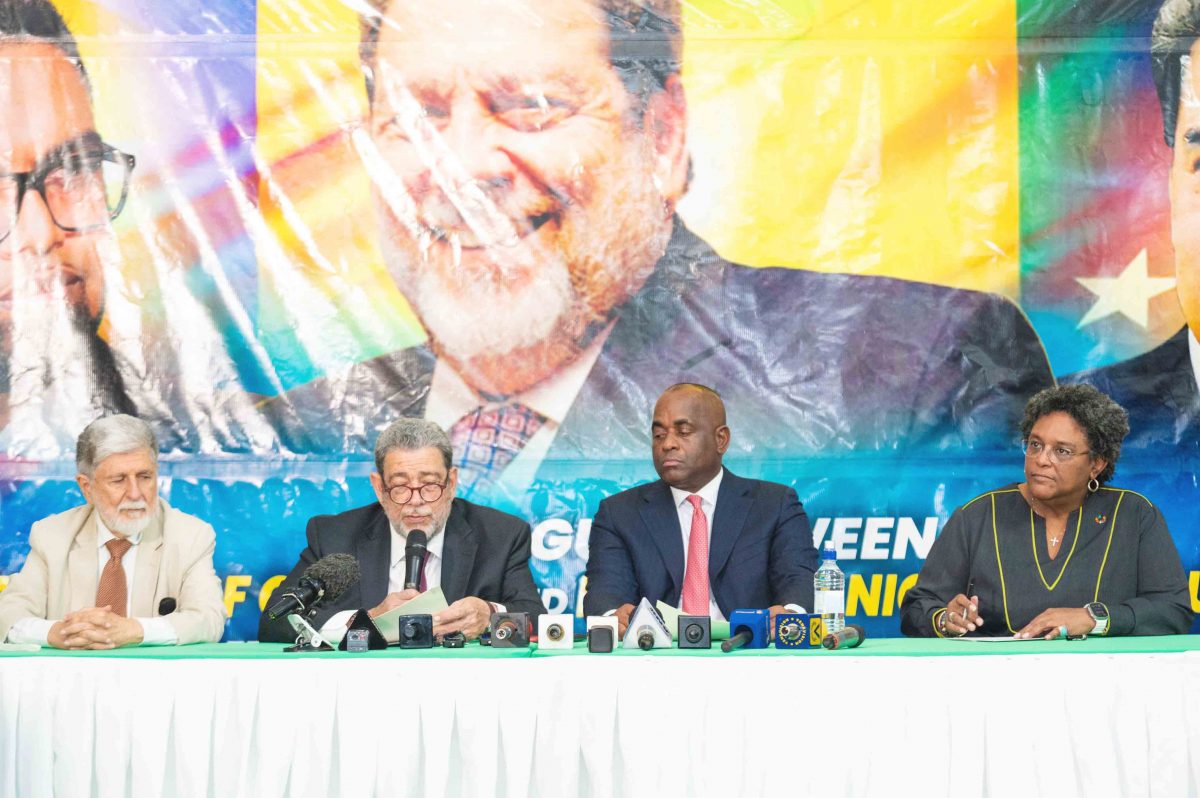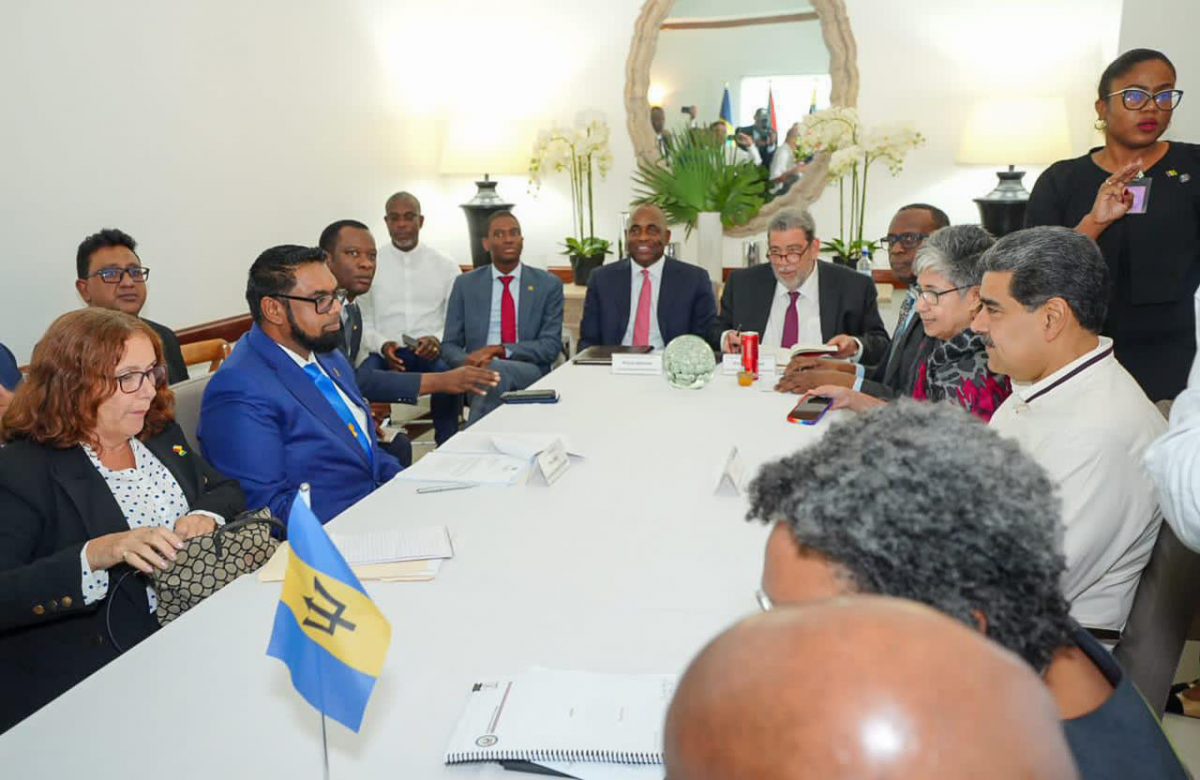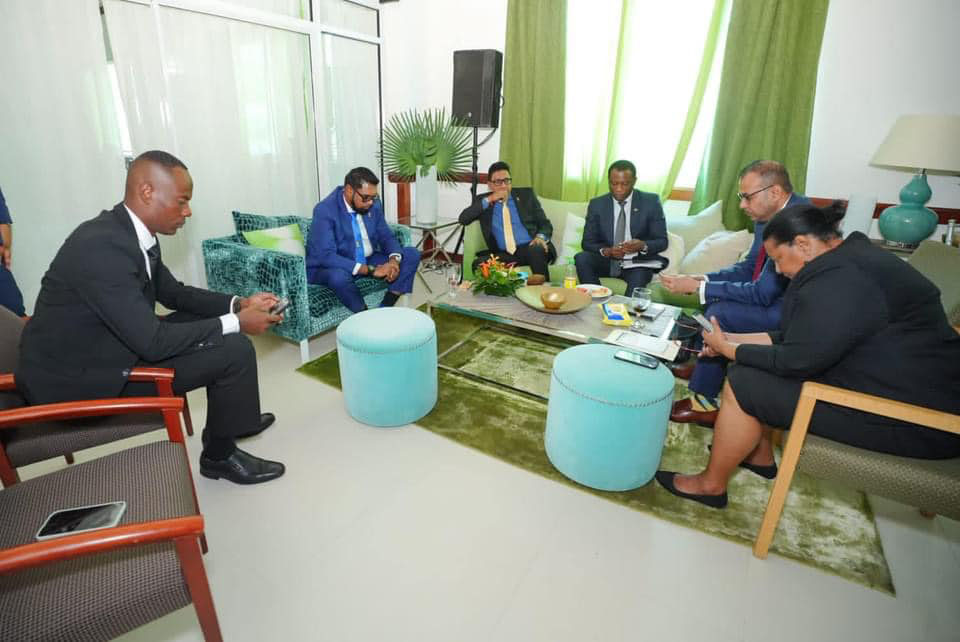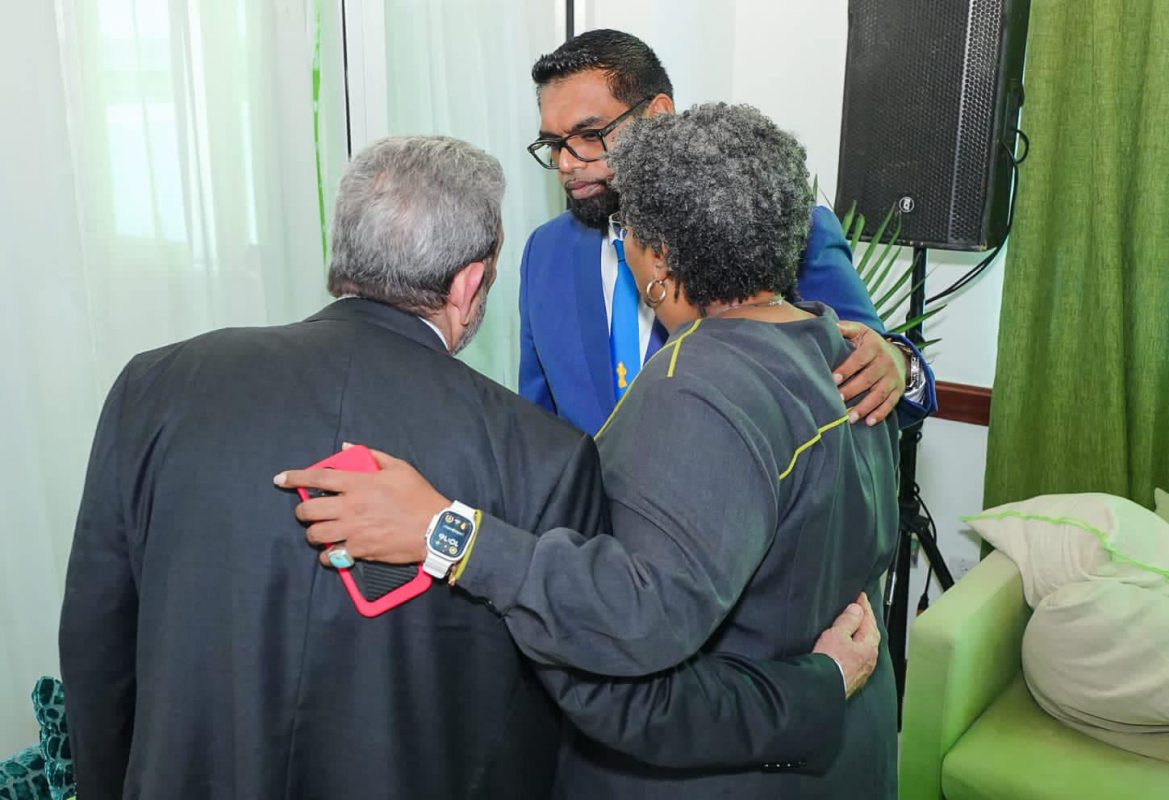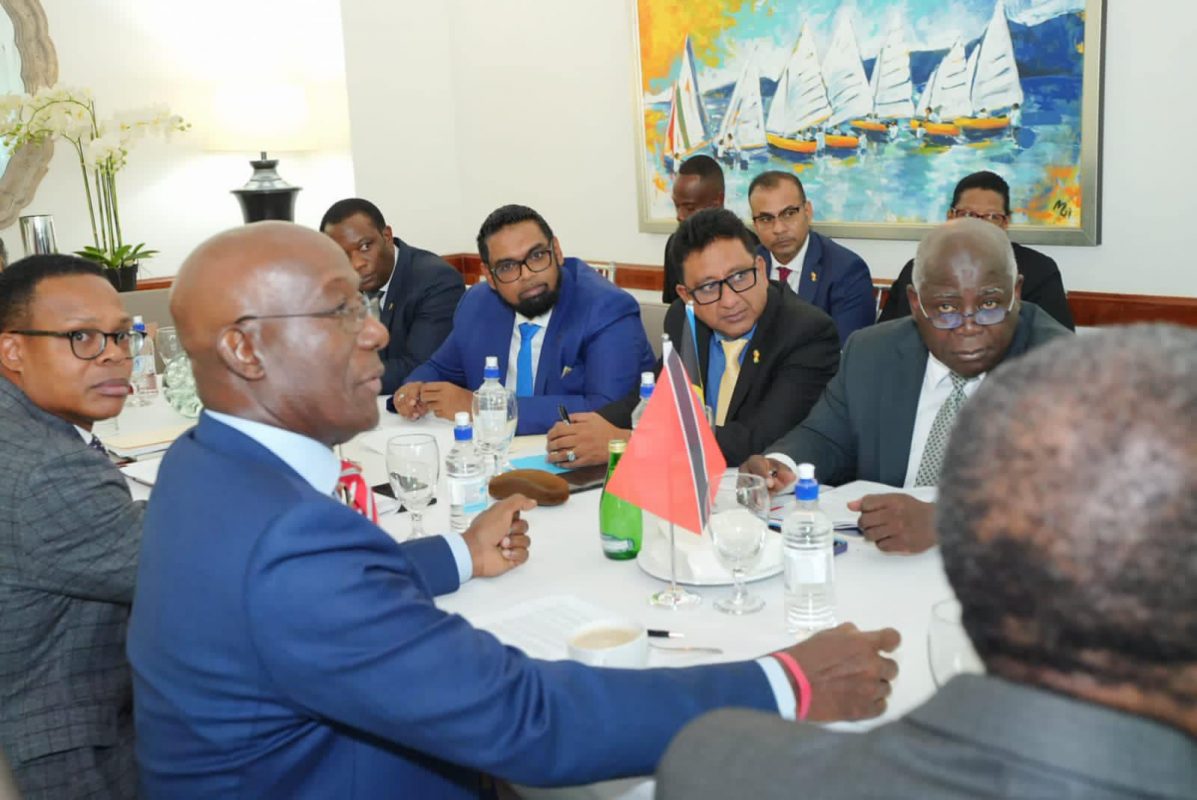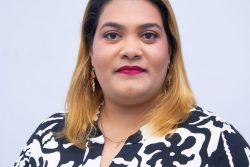-Joint Commission to be set up, any controversies to be resolved under international law
Guyana and Venezuela yesterday agreed not to use force against each other in any circumstance, a key development for Georgetown in the light of months of tension over Caracas’ staging of a referendum on Essequibo and its subsequent decision to annexe the county which makes up five-eights of this country.
Meeting in St Vincent and the Grenadines, President Irfaan Ali and his Venezuelan counterpart Nicolas Maduro held a series of talks before final approval of an 11-point joint declaration which said that they both “Agreed that Guyana and Venezuela, directly or indirectly, will not threaten or use force against one another in any circumstances, including those consequential to any existing controversies between the two States”.
Hammered out in the presence of high-level interlocutors including host, Vincentian Prime Minister Ralph Gonsalves; Celso Amorim, special envoy of the Brazilian President and Dominican Prime Minster Roosevelt Skerrit, the two leaders also agreed that any controversies between the two states would be settled in accordance with international law including the Geneva Agreement of February 17, 1966.
With a number of CARICOM Heads in attendance, the two presidents also agreed to the establishment of a joint commission. This would comprise the Foreign Ministers and technical persons from the two States to address matters as mutually agreed. An update from this joint commission will be submitted to the Presidents of Guyana and Venezuela within three months.
Noted in the Joint Declaration of Argyle for Dialogue and Peace between Guyana and Venezuela was this country’s assertion that it is committed to the process and procedures of the International Court of Justice (ICJ) for the resolution of the border controversy. Also noted was Venezuela’s assertion of its lack of consent and lack of recognition of the ICJ and its jurisdiction in the border controversy.
In the presence of other previously unannounced invitees including Colombia’s Foreign Minister, Alvaro Leyva Durán, the two Presidents also agreed to continue dialogue on any other pending matters of mutual importance to the two countries.
Also agreed at the cavernous Argyle Airport was that both States will refrain, whether by words or deeds, from escalating any conflict or disagreement arising from any controversy between them.
“The two States will cooperate to avoid incidents on the ground conducive to tension between them. In the event of such an incident the two States will immediately communicate with one another, the Caribbean Community (CARICOM), the Community of Latin America and the Caribbean (CELAC), and the President of Brazil to contain, reverse and prevent its recurrence”, the declaration stated.
Both States also agreed that Prime Minister Gonsalves, the Pro-Tempore President of CELAC, Prime Minister Skerrit, the incumbent CARICOM Chairman, and President Luiz Inacio Lula da Silva of Brazil will remain seized of the matter as Interlocutors and the UN Secretary-General, Antonio Guterres as Observer, with the ongoing agreement of Presidents Ali and Maduro. For the avoidance of doubt, Prime Minister Gonsalves’ role will continue even after St Vincent ceases to be the Pro-Tempore President of CELAC, within the framework of the CELAC Troika plus one; and Prime Minister Skerrit’s role will continue as a member of the CARICOM Bureau.
Both countries agreed to meet again in Brazil, within the next three months, or at another agreed time, to consider any matter with implications for the territory in dispute, including the aforementioned update of the joint commission.
Yesterday’s meetings were brokered by CARICOM and the Community of Latin American and Caribbean States and the idea was formally floated to Ali last Friday during an emergency meeting of CARICOM and he agreed. There had been no announced agenda for the meeting up to yesterday.
However, when Ali and Maduro arrived it was made known that there would be a meeting first of CARICOM Leaders with Ali, followed by a meeting of CARICOM leaders with Maduro, followed by the first face-to-face meeting between Ali and Maduro and their delegations followed by another engagement between the two on the way forward which then generated the joint declaration. These meetings went from roughly 10.30 am to 8.30 pm.
Emerged
After his first meeting with Maduro, President Ali emerged for a brief press conference with Guyanese reporters. He said then that there is “absolutely no retreat” from Guyana’s position that the border controversy be determined at the ICJ.
He said that the first meeting was among CARICOM Heads and they reasserted their support for Guyana and its position that the controversy be settled at the ICJ.
In the meeting with President Maduro, Ali said that he stated: “I made it very clear that Guyana has all the right to exercise its sovereign right within its territorial space to approve of and facilitate any development any investment, any partnership, any training, any collaboration, any cooperation, the issuing of any licence and the
granting of any concession within our territorial space and within our sovereign space. I made it clear that the controversy must be resolved at the ICJ and we are unwavering and resolute in ensuring that Guyana’s case is presented and defended and that the ICJ will issue its decision on the merits of the case which of course is binding on all the parties. I made it clear that the process leading to the ICJ is part of the Geneva agreement and that the Geneva Agreement provided for the UN Secretary General to determine where the controversy must be finally determined and it is the UNSG acting within the confines of the Geneva Agreement who determined that that place is the ICJ”.
He added: “We agreed with all he regional partners that the priority is peace and that every threat of force or the use of force must be denounced and that every party must take responsibility. We made it very clear that Guyana is not the aggressor. Guyana is not seeking war but Guyana reserves the right to work with all of our partners to ensure the defence of our country”.
Asked about the livery on the plane that brought Maduro declaring that Essequibo is their territory, Ali held up a wristband showing the map of Guyana.
“This tells you”, he said, tapping at his wristband. “I don’t have to think what it means. We know, we know what this means. This is Guyana. All of it belongs to all of Guyana. This is the map of Guyana. No narrative, propaganda, decree can change it. This is Guyana”, he asserted.
Stepped up
Venezuela stepped up sabre-rattling over its longstanding claim to Essequibo in 2015 when this country discovered oil in large quantities. Within days, the Maduro government had issued decrees claiming the waters where ExxonMobil had found oil even though this area was well away from waters that Venezuela had claimed. Caracas’ aggression was also tied to the Granger administration’s decision to seek a judicial settlement of the controversy over the 1899 Arbitral Award which fixed the boundary between Guyana and Venezuela. After a year of enhanced mediation failed tp move the process forward, the current UN Secretary General Antonio Guterres agreed to refer the matter to the International Court of Justice as catered for in the Geneva Agreement of 1966.
Guyana later lodged its case at the ICJ and while Venezuela initially didn’t participate it is now involved even while saying it does not recognise the jurisdiction of the court in the border controversy. The court is still deliberating on the merits of the case.
Following the awarding of oil blocks by Guyana in October this year, Venezuela announced a referendum for December 3rd seeking to annexe the Essequibo. This led Guyana to approach the ICJ for provisional measures against the impact of this vote. On December 1st, the ICJ ruled that Venezuela should do nothing to interfere with Guyana’s control over the Essequibo and it also enjoined both countries not to do anything to aggravate the substantive case before the court. Venezuela has since ignored both measures and has moved ahead with plans for the annexing of Essequibo including the naming of a commander for the area, the intended distribution of ID cards and the publishing of a new map of Venezuela that included Essequibo. There were also signs of military mobilisation on the Venezuelan side which prompted anxieties in Guyana’s border communities.
There then followed a series of diplomatic initiatives by the government and the Guyana Defence Force to ward off any risk of a Venezuelan attack. This drew statements of support from the United States, the UK, France and others and also solidarity from CARICOM, the Commonwealth and the Organisation of American States.
Last night, following the end of the meetings, President Ali offered thanks.
“I would like to thank our technical team, inclusive of all our state actors, lawyers, expert national, regional and international diplomats who supported us with their expertise on today’s endeavour.
“I also extend my gratitude to the leaders of CARICOM, CELAC, Brazil, representatives of the UN Secretary General, the Prime Minister and people of St Vincent and the Grenadines for hosting us”, he said.
Yesterday’s meetings were also attended nu Philip Davis, Prime Minister of The Bahamas; Mia Amor Mottley, Prime Minister of Barbados; Dickon Mitchell, Prime Minister of Grenada; Philip J. Pierre, Prime Minister of Saint Lucia; Prime Minister Terrence Drew of Saint Kitts and Nevis and Keith Rowley, Prime Minister of the Republic of Trinidad and Tobago.
Attending as Observers on behalf of António Guterres, Secretary-General of the United Nations were Earle Courtenay Rattray, Chef de Cabinet of the Office of the Secretary-General of the United Nations, and Miroslav Jenca, Under-Secretary-General of the United Nations Department of Political and Peacebuilding Affairs. In addition, Gerardo Torres Zelaya, Vice-Minister of Foreign Affairs of the Republic of Honduras, in his capacity as CELAC Troika, also participated.
All parties attending the meeting at Argyle, Saint Vincent and the Grenadines reiterated their commitment to Latin America and the Caribbean remaining a Zone of Peace, the joint declaration said.
